Eurovision 2023: From Duncan Laurence to Måneskin - the song contest stars since 1998
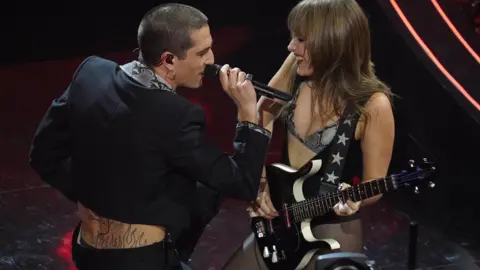 Getty Images
Getty ImagesThere is one month to go until the Eurovision Song Contest is held in the UK for the first time for 25 years, with a new crop of artists hoping to follow in the footsteps of past winners like Abba, Celine Dion and Måneskin.
A lot of things have changed about Eurovision since the UK last hosted the event in 1998.
But the world's largest live music event, which attracted more than 160 million viewers last year, still has the power to propel acts to international stardom.
As well as giving us icons like Abba in its earlier years, a number of artists have made it big internationally after competing in Eurovision in the past 25 years.
Here's a look at five of them.
1. Duncan Laurence
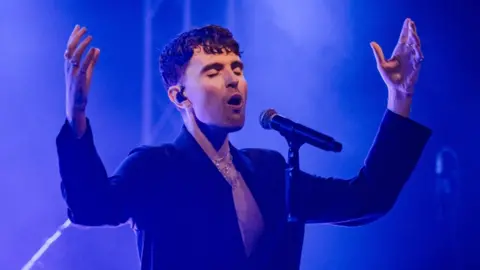 Getty Images
Getty ImagesI was getting my hair cut on Monday when a remix of the 2019 winning song came on in the barber's.
It was a reminder of just how big the song still is, almost four years since Duncan Laurence claimed victory for the Netherlands with Arcade.
It took a while for the song to break into the UK charts, only reaching the top 40 in February 2021. But Arcade is now the most-streamed Eurovision song of all time in the UK, and has had almost a billion global plays on Spotify alone.
It also became the first song from the contest in 25 years to chart in the US and has since been covered by Kelly Clarkson.
"To me it was always a dream to be known as a musician on a global scale," he told me last year. "The biggest moment was when we hit the one billion streams on all platforms."
This year he's involved in the song contest again, writing the entry for Dutch act Mia Nicolai and Dion Cooper.
2. Rosa Linn
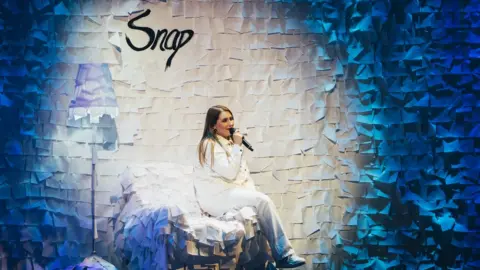 EBU/ Sarah Louise Bennett
EBU/ Sarah Louise BennettIf you'd asked any Eurovision fan this time last year which song from 2022 would become the runaway hit, few would have said Rosa Linn from Armenia.
Her song Snap ended up finishing 20th out of 25 in the final which, she told me on the BBC's Eurovisioncast, left her really upset.
Fast forward less than a year and it's become a viral hit, as well as a chart one, which has led to her having the second most-streamed song from the competition's history - with more than half a billion plays.
With a new music video for a US audience and after a performance on James Corden's The Late Late Show, the 22-year-old is preparing to support Ed Sheeran on his stadium tour in the US this summer.
Rosa Linn has proved that thanks to platforms like TikTok, songs can continue to grow long after the competition finishes.


3. Daði og Gagnamagnið
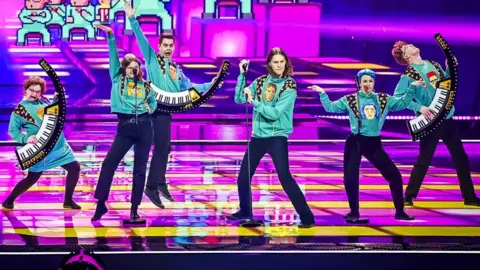 Getty Images
Getty ImagesIceland really wants to win Eurovision, and not just as part of the plot in Will Ferrell's Netflix film about the contest.
Despite making its debut in 1986, it is yet to triumph for real. It stood a strong chance in 2020 with Daði og Gagnamagnið's Think About Things - before that year's competition was cancelled because of the pandemic.
Yet again showing how the contest has an influence on TikTok, the dance became a viral hit as Europe went into lockdown, and families, friends and Strictly contestants did dance challenges.
Allow Google YouTube content?
Daði og Gagnamagnið returned in 2021, placing fourth with a new song - but they were prevented from performing live in Rotterdam after a band member tested positive for Covid.
4. Måneskin
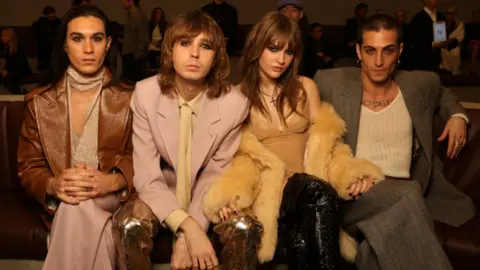 Getty Images
Getty ImagesA friend who wouldn't describe himself as a Eurovision fan WhatsApp'd me after Måneskin won in 2021, saying: "I don't understand Eurovision."
He couldn't work out how a glam rock song performed entirely in Italian would be the favourite across Europe, following the previous year's winning ballad Arcade.
Zitti E Buoni was just the first of Måneskin big hits, and was followed by their cover of The Four Seasons' Beggin' (which gave them their first US hit), I Wanna Be A Slave, Mamma Mia and Supermodel.
Now they're one of the biggest bands in the world and were nominated for best new artist at this year's Grammy Awards.
The last time I interviewed them, they said the only place they don't get spotted now is in Los Angeles, because everyone else there is famous too.
A handful of other Italian Eurovision artists have also had success following their participation - despite not winning - including Mahmood, Marco Mengoni and Il Volo.
5. Conchita Wurst
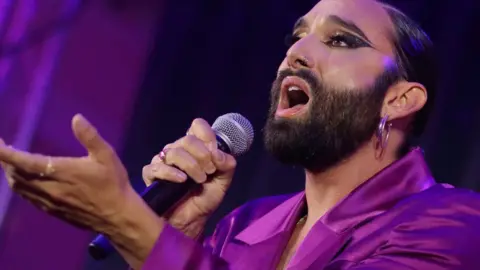 Getty Images
Getty ImagesI remember watching Channel 4's Gogglebox in 2014 as the armchair cast watched Conchita's performance of Rise Like A Phoenix.
There was initial nervous curiosity, much like across Europe, but by the end of the three-minute performance everyone on their sofas was cheering Conchita on as the Bond-esque track came to a close.
Last November, I saw Conchita perform and the crowd's response was still as loud as it was eight years earlier, when Wurst became one of the best-known contestants in the competition's history.
Outside music, Conchita also campaigns for LGBT rights across the world and has spoken at the United Nations.
When I ask people for their most memorable Eurovision win in the past 25 years, the majority say Conchita.
And.... Malena Ernman
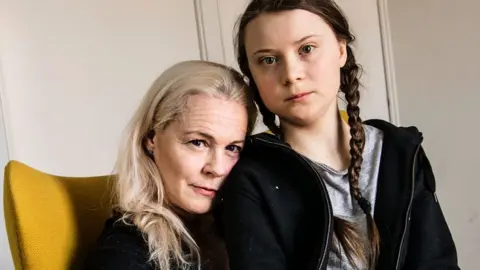 Getty Images
Getty ImagesMalena Ernman has become a global name after participating in Eurovision, but mainly outside the music industry.
She sang La Voix in 2009 for Sweden, eventually coming 21st. Nine years later, she was thrust into the international spotlight again when her daughter Greta Thunberg began protesting outside her school for climate action.
Ernman is still an opera singer, but is perhaps now better known for supporting her daughter and championing environmental causes.

All the build-up, insights and analysis is explored each week on a BBC podcast called Eurovisioncast.
Eurovisioncast is available on BBC Sounds, or search wherever you get your podcasts from.

